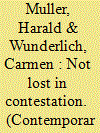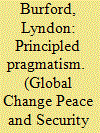| Srl | Item |
| 1 |
ID:
168869


|
|
|
|
|
| Summary/Abstract |
For decades, the world's smallest states – the structurally weakest members of the multilateral system – have been considered incapable of influencing international organisations (IOs). So, why has the label small state risen to prominence over the last two decades and become institutionalised as a formal grouping in multiple IOs? Drawing on more than eighty in-depth interviews, we explain the rise of Small Island Developing States in the United Nations system, the expansion of their agenda to the Small and Vulnerable Economies group at the World Trade Organization, and then to other IOs. The adoption of the labels is evidence of small state norm diffusion. We identify the competent performance of vulnerability within multilateral settings as the key to explaining this norm emergence and diffusion. The lesson is that diffusion ‘from below’ is not always driven by a desire to increase rank. In this case small states have gained benefits by maintaining a lowly position in a hierarchy in which large is stronger than small.
|
|
|
|
|
|
|
|
|
|
|
|
|
|
|
|
| 2 |
ID:
158673


|
|
|
|
|
| Summary/Abstract |
With near universal membership, the nuclear nonproliferation regime can be considered a success of global nuclear governance. While it has proven robust since the Nonproliferation Treaty entered into force in 1970, the regime has faced continuous contestation, precisely because it is a delicate compromise between the nuclear and non-nuclear weapon states. In this article, we analyze the patterns of contestation within the regime as well as the actors driving these contestation processes. Our purpose is to assess how contestation has affected the development of nuclear norms. We show that contestation can lead to normative progress, result in blockage, or even lead to decay. We argue that the outcome depends on three factors: commitment by the powerful parties to appreciate the positions of the non-nuclear weapon states, the engagement of bridge-builders to shape compromises, and the construction of reciprocal gains for and compliance by all parties.
|
|
|
|
|
|
|
|
|
|
|
|
|
|
|
|
| 3 |
ID:
101831


|
|
|
|
|
| Publication |
2011.
|
| Summary/Abstract |
From 1995 to 2000, transnationally active, New Zealand non-governmental organisations and individuals influenced New Zealand nuclear disarmament policy in significant and sometimes pivotal ways. During this period, New Zealand emerged as a global norm leader, experiencing the zenith of its influence on international nuclear disarmament diplomacy. As such, the NGO activity examined here also had significant downstream effects on international political, legal and normative developments. This article broadens the body of empirical data on the work of transnational disarmament advocacy. Its findings reinforce and deepen constructivist understandings about the importance of non-traditional actors and ideational factors such as norms, identity, and ethics in the conduct of international relations.
|
|
|
|
|
|
|
|
|
|
|
|
|
|
|
|